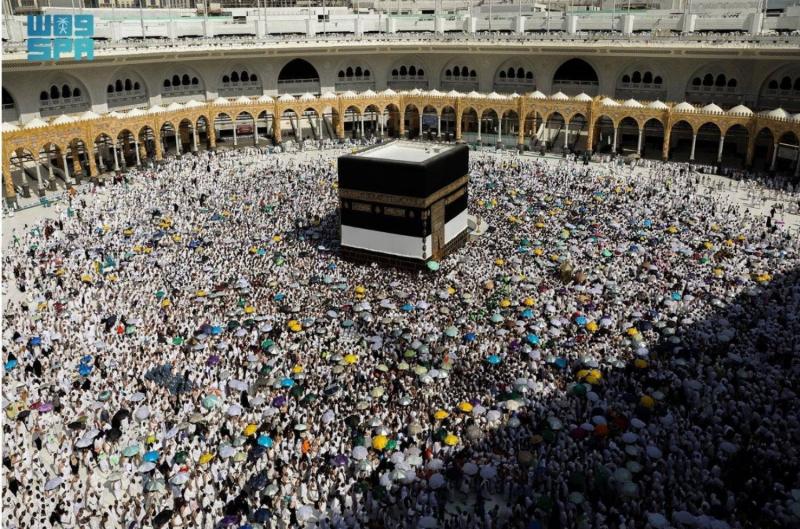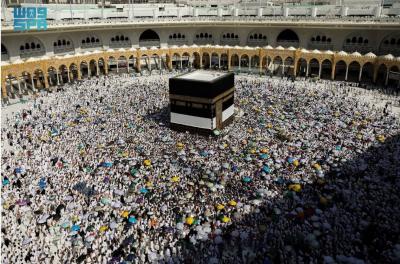For more than fourteen centuries, Muslims have awaited the Hajj season each year to perform a pillar of Islam, to fulfill their religious duties, and to complete their rituals, "to finish their rites, fulfill their vows, and circumambulate the ancient house." With the rise in the number of Muslims globally to one and a half billion and the ease of modern transportation, combined with the limitations of space in Mecca and the holy sites, as well as the restricted timing during the few days of Dhu al-Hijjah, Muslims have had to develop new policies. One such policy has been to agree on specific quotas for the population of each country to perform the Hajj each year, which has been accepted by all Islamic countries. This practice has been ongoing for decades and is something not known in the ancient history of Islam. However, changes in time, place, and circumstances have compelled Muslims to evolve their positions, policies, and religious discourses, making the performance of this rite more manageable.
For almost a century, the Saudi state has fully managed the pilgrimage, with its kings proudly carrying the title "Custodian of the Two Holy Mosques." The pilgrimage holds a special place in the Vision 2030 plan led by the Crown Prince of Saudi Arabia, which has facilitated many procedures for those wishing to perform Hajj and Umrah, alongside significant expansions and high-quality services at the Two Holy Mosques. Above all, it has provided security and safety to perform the religious obligations with ease, which are historical achievements and contemporary developments acknowledged by everyone.
Apart from the ancient history marred by strife and incidents related to the Hajj, in the modern era, Hajj has not been targeted nor sought to be diverted from its religious role as a pillar of Islam, except by two specific factions: First, Sunni fundamentalism, which includes groups like the Muslim Brotherhood and similar political Islamist organizations or religious violence organizations such as Al-Qaeda and ISIS. Second, Shia fundamentalism or the Shia version of political Islamist movements, whether from the sponsoring state itself or from associated groups, parties, and militias.
In this year's Hajj of 1445 in the Hijri calendar, or 2024 in the Gregorian calendar, both fundamentalist factions continue to target Hajj, and they alone, without the other one and a half billion Muslims, seek to disrupt the pilgrimage. Sunni fundamentalism and the "international organization" of the Muslim Brotherhood, along with other political Islamist figures and groups, are orchestrating a campaign to cast doubt on the safety of Hajj for political gains, nothing less and nothing more. Meanwhile, the Shia fundamentalism speaks of "disavowing the polytheists" during the Hajj. Both factions are fully aware that Saudi Arabia has never allowed, nor will it ever allow, any political exploitation of Hajj from any party, regardless of who stands behind that exploitation.
During the reign of King Abdulaziz, Hassan al-Banna, the founder of the Muslim Brotherhood, performed Hajj about ten times, but King Abdulaziz firmly refused to allow al-Banna to open a branch of the group in Saudi Arabia and warned him against any political exploitation of Hajj, even protecting al-Banna himself from a political target for assassination during Hajj. Despite the group's awareness of Saudi Arabia's refusal to politicize Hajj, it has always exploited the season to strengthen the organization's cohesion, rally followers, and promote its ideology. The second fundamentalism followed the same path; after the "Islamic Revolution," the idea of "exporting the revolution" emerged, meaning its transfer to Arab countries, from which the innovation of "disavowing the polytheists" during Hajj was born. Over the past four decades, unfortunate events have occurred that bring shame to Islam and Muslims, but Saudi Arabia has consistently remained vigilant against these two factions.
In the Hajj of 1987, trained elements from the "Revolutionary Guard" targeted the safety of pilgrims, purchasing sharp and deadly instruments such as knives, cleavers, and sticks, and staged a massive, bloody, and violent demonstration, killing anyone in their path, including safe pilgrims and security personnel, until the "Saudi forces" bravely confronted them, imposing security by force, allowing Muslims to complete their Hajj and perform their rituals.
Afterward, the targeting evolved to deadly bombings in Hajj 1989, but Saudi Arabia was once again alert, managing to uncover all plots and conspiracies before they occurred, protecting Hajj and pilgrims from any malicious targeting under any political, religious, or sectarian banner.
What is surprising and saddening is that these two extremist "fundamentalist" factions target the Hajj season and safe pilgrims under slogans that invoke the name of "Islam," claiming to represent and defend it while targeting the destruction of one of its pillars, which confirms that criticizing these fundamentalist discourses is an unavoidable duty.
Finally, ensuring the safety of Hajj and pilgrims is a significant task in which Saudi Arabia has always succeeded, and this year's Hajj will continue that legacy of success and security. Best wishes to everyone each year.




